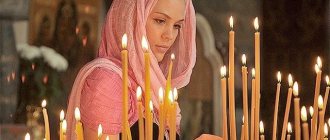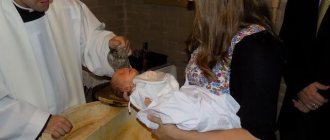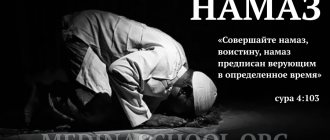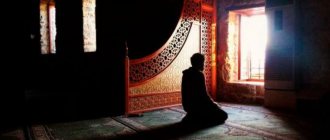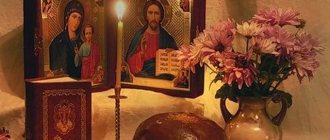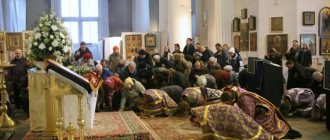"Save me, God!".
Thank you for visiting our website, before you start studying the information, please subscribe to our Orthodox community on Instagram, Lord, Save and Preserve † - https://www.instagram.com/spasi.gospodi/. The community has more than 60,000 subscribers. There are many of us like-minded people and we are growing quickly, we post prayers, sayings of saints, prayer requests, and timely post useful information about holidays and Orthodox events... Subscribe. Guardian Angel to you!
Today, more and more people decide to attend church. Of course this is very good. After all, the increase in the number of parishioners indicates to us nothing other than the strengthening of the Orthodox faith. When starting to attend church, not all people know how to behave in church. In this article we will tell you in detail how to properly visit an Orthodox church for the first time and what you need to do in it.
How to behave for the first time in church
Many people think that no preparation is necessary to visit the temple. Actually this is not true. You need to pay attention not only to proper preparation, but also to clothing. And so there are several recommendations on how to behave correctly in church:
- Applies to morning visit. After sleep, you need to get up, wash, light a lamp and thank God in prayer for the opportunity to spend the night in peace and quiet. Then read the Gospel chapter. Beginners are recommended to use the abbreviated prayer book.
- Cloth. You can’t go to the temple wearing just anything. You cannot wear trousers, short skirts, shorts, bare shoulders, etc. Also, a woman should not wear bright makeup. A woman must have a headscarf or scarf on her head. But men, on the contrary, must remove their hats before entering the church.
- Food. Many people don’t think about whether they can eat before visiting a temple. First they get enough, and then they go to church. In fact, according to religious rules, you need to come to the temple hungry. That is, on an empty stomach. Retreats are only possible for sick people and pregnant women.
- Bags. There is an opinion among people that you cannot enter the temple with bags. But if there is a need for it, why not. You won't leave it at the entrance.
- Bows. You must enter the temple with a bow, after crossing yourself. In this case, you need to bend three times.
The best article for you, go to: How to deal with the mortal sin of despondency, the Orthodox answer
For the first bow they say:
God, be merciful to me, a sinner.
To the second bow:
God, cleanse my sins and have mercy on me.
To the third:
Without number of sins, Lord, forgive me.
You need to look at the image of the Savior and say a prayer. The same thing needs to be done when leaving the temple. On your first visit, be sure to take a look around. Look at what people around you are doing. Which image do they worship more, where do they put candles, etc.
During the service, you cannot behave as if you are at an exhibition. That is, lift your head and look at everything around you, including the clergy. During prayer, you must stand with repentant feelings, while slightly lowering your head and shoulders. Try to repeat bows and the sign of the cross after everyone at the same time.
The main thing is to remember that the church is an earthly heaven where people come to pray for their earthly sins.
- Time spent in church. According to church canons, service is a sacrifice to God. It must be defended from the beginning to the very end.
- Should I stand or sit during the service? This question torments many. Of course, if you are young and healthy, you will need to stand throughout the entire service. The exception, as many understand, is only the elderly and sick people.
The best article for you, go to: How to bury suicides, suicides and suicidal people, how to behave at funerals
These are basic recommendations on how to behave in church and what to do. Believe me, when you come to church for the first time, you will not know any church canons. But over time you will definitely figure it out.
Why go to an Orthodox church every Sunday?
The content of the article
A week has 168 hours; Of these, God has appointed only one for Himself - and you spend it on worldly pursuits. ... you neglect this occasion in order to attract the grace of your God to yourself.
St. John Chrysostom, "On the Holy Eucharist."
You cannot work on holidays unless absolutely necessary. The holiday should be cherished and honored. This day should be dedicated to God: be in church, pray at home and read the Holy Scriptures and the works of the holy fathers, do good deeds.
Venerable Nikon of Optina
Every Sunday is a small Easter; That’s why this day is called the day of the Resurrection. Let us fill our hearts with the joy of the Resurrection and let us now leave the church with light in our hearts, with light in our souls, with a bright mind, so that everyone who meets us will be illuminated by this light of the Resurrection of the Lord. Saint Seraphim of Sarov said: take care that every soul around you is joyful, because it is easier for a joyful soul to find God, but it is difficult for a bitter soul... If only we knew how to go into the world, into the sorrowful world in which we live, with joy, if every heart around us became quiet, every tension subsided, if there was light around us, then they would talk about us, like the early Christians: “How they love each other!” - and they would ask themselves: what do these people have that makes them incomparable, makes them what another person cannot be? Where do they get this joy, which neither the cold nor the grief of life can extinguish - where do they get this?.. If only, looking at us, people could ask themselves this question, the Lord would give them the answer.
Metropolitan Anthony of Sourozh
Sunday is both day one and day eight. The first is inside the sevenfold cycle, the eighth is like breaking the ring and going beyond. On that first day, the day of creation, the Lord created light and separated the light from the darkness. How joyful it is to notice the similarity with Sunday. After all, the Risen Christ conquered darkness, made it visible and gave man the opportunity to emerge from it into the light. As for the eighth day, the liturgical celebration of Sunday makes us partakers of blessed eternity, that ever-lasting wedding feast of which the Gospel speaks. It is the eighth day that the Fathers call the future age. The seventh day of creation, on which God does not create anything new, but controls what has already been created, continues to this day. With the coming of Christ and His righteous Judgment, a new day will begin—the eighth—and the Kingdom of Christ will begin, and there will be no end to it. Thus, in the celebration of Sunday, both ends of history are united - its creative beginning and its grandiose conclusion. And all the luxury of this theological meal is available to every person participating in Sunday prayer.
******
The redemption of the world is a work of greater love than the creation of the world. The fact that God, without getting tired, created a wonderful world speaks of His omnipotence and intelligence. And the fact that He sent the Only Begotten Son so that the world could be saved in Him speaks of His love. What do we do? What should we thank God for more? For omnipotence - or for love for us, the fallen? The Church says: for love. The Church does not abolish the Sabbath, calls it a holiday, and fills it with prayer. But above Saturday, the Church places the first day - Sunday. We celebrate it more, and for us it is an eternal reminder of the One who loved us and gave Himself for us.
So, Easter has come and will go in its turn, but life will continue. How long will Easter be gone? For a week only. Every Sunday is Easter day. A true admirer of the Risen Lord is not the one who comes to a long and special Divine Service once a year, weighing down his hands with baskets of food, but the one who every week on Sunday honors and glorifies the Conqueror of death - Jesus Christ.
Archpriest ANDREY TKACHEV
The most important spiritual blessings given to us by God in the Church are faith, prayer, confession and communion of the Holy Sacraments. Fasting and doing good to others are also important.
right John of Kronstadt
Orthodox priest about Sunday
Reward for going to Church on Sunday
How many of the highest, purest and holy consolations we receive from the Lord for going to the Church of God! If we spend Sundays and holidays holy, according to God’s law, then God’s grace will be not only on our souls, but also on all our enterprises and circumstances of our lives. Where, if not from the temple of God, come from all the gifts of God, heavenly and earthly? Where is it easiest to hide from all danger and from all troubles, if not under the shadow of the temple of God? What grace of God we deprive ourselves of when we are not in the church of God! How much grace-filled consolation and joy a Christian soul can receive in the temple of God! What peace and joy our hearts are filled with from the grace-filled visit to the temple of God! And this blessed feeling remains in our hearts for a long time. It renews our soul, refreshes and strengthens our strength, tired by everyday work. Only in God, in prayerful communication with Him, do we find true joy. Only in prayer does our soul become peaceful and brighten with spiritual joy. Then worldly worries are abandoned, worldly affairs are forgotten. Only in one temple of God does everything remind us of the Divine, the heavenly.
The Temple of God is our heaven on earth. There our mind and heart are raised to God, inflamed with feelings of repentant tenderness and heartfelt contrition, thanksgiving and glorification. The world cannot give us true comfort. Only in joy in God, according to Blessed Augustine, can one find true, eternal peace and joy. Worldly joys are temporary and quickly give way to sorrows and disasters. Only those who are lazy and careless about their salvation should never go to the Church of God on a holiday. If a true Christian does this, his heart will be heavy, his soul will be gloomy, his conscience will be restless. Without going to church, he will feel like he has lost something. Who has not experienced the sweet consolation of visiting the temple of God and the reproach of conscience for omission? Nothing sweetens our lives more than the consolation we receive in church. In church our grief is lessened.
In church, our sadness is replaced by spiritual joy and consolation. In church, those burdened with labor receive rest and tranquility. Then the Lord calls us all to himself: “... come to me, all you who labor and are burdened with earthly sorrows and illnesses, and I will give you rest” (Matthew 11:28). Did family grief kill you? Is your heart oppressed and tormented by melancholy and inconsolable sadness? Do your chest hurt from heavy sadness? Hurry quickly to the temple of God. Tell all your sorrows to the Savior. There, at the foot of the Cross of Christ, you will receive relief from sorrows and sorrows...
From the collection of edifying stories "Spiritual Niva"
The Lord prays in the desert, in secluded places, but together with believers He also comes to church. Not because he needs it, but to show us how we should act. Every Sunday and holiday we must be in church. This commandment, along with the most important ancient ones, which set a limit to the decay of human life, is the same as “do not kill,” “do not steal,” “do not fornicate.”
This is what today's Gospel is about. The Lord heals a woman from a serious illness. She was possessed by a spirit of infirmity, bound by Satan, and bent to the ground for eighteen years. She could hardly move. And yet she came to the temple of God. How surprised we were at this before, when there were mostly grandmothers in the church. Weak, decrepit, they really can barely walk, but they don’t miss a single service! Both in the morning and in the evening - because the soul is drawn to where the Lord is, where true life is revealed. And no weakness is an obstacle for them. We should be all the more ashamed, when God has not yet taken away our health, to blatantly violate one of His main commandments—to miss holiday and Sunday services.
The Lord performs a miracle on this woman for the sake of her fidelity to the commandment of God. Although she no longer hopes for anything, she is ready to bear the yoke of her weakness until death. But it is important for her to come to where the word of the Lord is proclaimed, where the most important thing for a person is given. In an instant, this woman is healed, straightened, and praising God.
And her condition was truly terrible. Bent to the ground, she walked almost on all fours. From a distance one could think that it was some kind of animal moving. This is the spiritual state of man after he has fallen away from God. He cannot straighten up, raise his face to the sky, or see the face of another person. Only what is below nourishes and inspires him. All his joy is in what the earth gives. But what is higher, eternal life, heavenly joy, is unattainable for him. Man has become like an animal, bent to death, although physically he can sometimes raise his head very high.
St. Nicholas (Velimirović), a Serbian saint recently glorified by the Church, says that, looking at this miracle, we can understand the absurdity of the teaching of materialists who argue that man descended from a monkey: he walked for thousands of years on all fours and then gradually straightened up. In an instant, the Lord straightens a man bent to the ground. And in an instant He creates man as he must be in order to participate in the life created for him by the Lord.
Everyone sees this woman straighten up and praise the Lord. And we see, in addition to the phenomenon of light, the phenomenon of darkness. How darkened is the ruler of the synagogue, the guardian of God's Law! Fearing to expose Christ Himself (because he does not find the inner strength for this), he turns to the people: “There are six days on which you can heal, and the seventh is a day of rest, the Sabbath day; and no one can violate it.”
Look what's happening. The light of the miracle blinds this teacher of faith, and he wants to close it off from other people. It is not clear to anyone that God Himself is at work here. But the leader of the synagogue wants to turn God’s miracle into an ordinary, meaningless event. External observance of the rules is more valuable to him than anything in the world, and he is ready to forbid God Himself to perform works of mercy on the Sabbath.
The woman no longer hoped for anything. But the Lord Himself called her. And Himself, before she turned to Him, performed this miracle. If the Lord does not come to us, we will perish in our sins. “Truly I tell you,” He says Himself, “if you do not know that it is I—that My grace, My power, My love is at work in these signs and wonders—you will perish in your sins.”
Godliness and love are one and the same thing. The meaning of piety is love, compassion for another person. The Lord says: if any of you has any cattle, a donkey or an ox, will you not untie it on the Sabbath day and take it to water? Every person does this; it would be wild and cruel to an animal not to give it something to drink. Is it really possible that this daughter of Abraham, whom Satan has bound and has been torturing for eighteen years, cannot be freed from suffering! Isn't that what the rest of the Sabbath is for? The mystery of God’s mercy, eternal life—that’s what this “peace” is. And only through compassion, through true piety, can we enter into it.
The Lord exposes the sin of hypocrisy. Of all sins, this is the most heinous. We remember with what anger the Lord repeatedly repeats: “Woe to you, scribes and Pharisees, hypocrites.” He does not say these words to any of the ordinary people: “Woe to you” - only to the Pharisees. Because “external appearance with internal emptiness” will be the “secret of lawlessness” in the Church. “Hear the word of the Lord,” warns the prophet Isaiah. “I can’t stand your holiday gatherings—they are lawless.” My soul hates your holidays - they are a burden for Me, It’s hard for Me to bear them. And when you stretch out your hands, I close My eyes from you. Your hands are full of blood. Wash yourself, cleanse yourself, stop doing evil, learn to do good. Seek righteousness, save the oppressed, defend the orphan, intercede for the widow” (Isa. 1: 14-18). And then the mercy of the Lord will appear and a miracle will happen. God is fire, says St. Seraphim, not rituals, not fasting and prayer, not good deeds, but the fire hidden in them. It is not our external presence at the holiday, but the presence of the holiday within us.
The secret of the miracle lies, says the holy righteous John of Kronstadt, in unfeigned, sincere prayer. When they asked him: “Why is the Lord giving you such an amazing gift?”, he answered: “This is the grace of God. I just always try to pray sincerely, with all my heart, and not allow a single drop of falsehood in my relationships with God and with people.” Where there is directness of these relationships, there is the light of Christ, there the miracle of God’s love is revealed, there souls bent to the ground by sin are straightened.
The woman, having accepted the gift of healing, thanks the Lord. And all the people are amazed at what the Lord has done. A person who has received healing by the grace of God cannot help but thank God. It's natural for him. And this is a sign of his healing, because no one is able to bring praise to the Lord until his sick soul is healed. The grace of Christ can straighten everything that sin has twisted in our lives.
Archpriest Alexander Shargunov
Look, rarely will any church have as many people on St. Nicholas Day as on an ordinary Sunday. As a rule, there will be fewer people on an ordinary Sunday, and more on St. Nicholas. And what should we call it? What name should I give to this walking on my head and turning my life upside down? If we want to honor the saints, we must first honor the Lord, who sanctified His chosen ones. We must honor Him before Whom all holiness fades, for He alone is Holy! Before Him “twenty-four elders fall down and worship, and lay their crowns before the Throne, saying: “Thou art worthy, O Lord, to receive glory and honor and power: for Thou hast created all things, and by Thy will all things exist and were created” (Rev. 4:10–11)
Nicholas can ask all his unreasonable readers: “Why do you go to church on my day, but not on the day of the Resurrection of the Lord? Why do you honor me, and not worthily honor the One whom I serve in deed, word, and thought? Why do you know how to read, but are not diligent in reading the Gospel?” And so on.
On the day of memory of Nicholas, you need to take the Holy Book from his hands. As soon as we take it from him, he will immediately have another one just like it in his hands, so there will be enough for everyone who wants it. Having taken the Book, let's make it a rule to read it daily: a chapter in the morning before work, a chapter in the evening before bed. What you read, although not immediately, although not without difficulty, will cling to your memory and become an object of reflection amid the bustle of the day and everyday activities.
Archpriest ANDREY TKACHEV
If we spend Sundays and holidays holy, according to God’s law, then God’s grace will be not only on our souls, but also on all our enterprises and circumstances of our lives. Where, if not from the temple of God, come from all the gifts of God, heavenly and earthly? Where is it easiest to hide from all danger and from all troubles, if not under the shadow of the temple of God? What grace of God we deprive ourselves of when we are not in the church of God! How much grace-filled consolation and joy a Christian soul can receive in the temple of God! What peace and joy our hearts are filled with from the grace-filled visit to the temple of God! And this blessed feeling remains in our hearts for a long time. It renews our soul, refreshes and strengthens our strength, tired by everyday work. Only in God, in prayerful communication with Him, do we find true joy. Only in prayer does our soul become peaceful and brighten with spiritual joy. Then worldly worries are abandoned, worldly affairs are forgotten. Only in one temple of God does everything remind us of the Divine, the heavenly. The Temple of God is our heaven on earth. There our mind and heart are raised to God, inflamed with feelings of repentant tenderness and heartfelt contrition, thanksgiving and glorification. The world cannot give us true comfort. Only in joy in God, according to St. Augustine, can one find true, eternal peace and joy. Worldly joys are temporary and quickly give way to sorrows and disasters. Only those who are lazy and careless about their salvation should never go to the Church of God on a holiday. If a true Christian does this, his heart will be heavy, his soul will be gloomy, his conscience will be restless. Without going to church, he will feel like he has lost something. Who has not experienced the sweet consolation of visiting the temple of God and the reproach of conscience for omission? Nothing sweetens our lives more than the consolation we receive in church. In church our grief is lessened. In church, our sadness is replaced by spiritual joy and consolation. In church, those burdened with labor receive rest and tranquility. Then the Lord calls us all to himself: “... come to me, all you who labor and are burdened with earthly sorrows and illnesses, and I will give you rest” (Matthew 11:28). Did family grief kill you? Is your heart oppressed and tormented by melancholy and inconsolable sadness? Do your chest hurt from heavy sadness? Hurry quickly to the temple of God. Tell all your sorrows to the Savior. There, at the foot of the Cross of Christ, you will receive relief from sorrows and sorrows...
From the collection of edifying stories "Spiritual Niva"
I was thinking about Russia today and came to the conclusion how happy you are, how many churches and monasteries in Russia are being revived, bells are ringing all around, you don’t need to travel tens or even hundreds of miles to get to the Divine Liturgy. In some churches, even two or three Liturgies are celebrated on Sundays. Here's Grace!!! Appreciate this gift!!! Hurry to the Feast of the Called, about which St. wrote. Seraphim Zvezdinsky in his will!
“There are many bright stars in the sky, these sparkles of God’s robe, but the sun is more beautiful, lighter, brighter than all of them. There are many fragrant flowers in the pastures and fields, but the best, most beautiful, most fragrant of all of them is the rose. Many rivers, streams, lakes, streams run across the face of the earth, and they all converge, merge into a boundless, huge, immeasurable ocean. Many beautiful bright stones are stored in the bowels of the earth; There are sapphires, emeralds, and yachts, but the most beautiful, the purest, the brightest sparkling diamond is the diamond.
And in the spiritual world there are stars, and precious stones, and flowers in spiritual pastures. Many wonderful stars - hymns - are preserved in the Orthodox Church (patristic creations), but they all converge in the sun of our Church - in the Divine Liturgy. There are many wonderful flowers in church pastures, but the most beautiful of all is the rose - the Divine Liturgy. Wonderful are the precious stones of our Church - the rituals, but the brightest shining diamond of them all is the Divine Liturgy.
Ancient Christians began every day by attending the Liturgy. They understood well what happiness was given to people in the Sacrament of Communion; they approached the Holy Chalice every day, so pure was their life.
Love the Divine Liturgy, take care of the fragrant rose of Christ, enlighten your souls with the light of the Divine sun; ...Let your eyes always see the Divine Chalice, let your ears always hear: “Take, eat.” Always thank the Lord for that greatest gift, before which the angels tremble. »
Saint Seraphim Zvezdinsky - THE BREAD OF HEAVEN
My dear! Wasn't a whole week enough for you to cope with your everyday routine? Remember: money earned on Sunday is a fire that will consume the rest. Work as much as you want, but God will give you as much as He deems necessary. Besides, Sunday is God's day, which you should dedicate to Him. Your most important work on this day is to go to church, pray, and hear the Word of God. And, of course, the whole family. I emphasize: the whole family. After all, if children do not get used to the temple when they are small, they will not enter it when they are older. On Sunday you should take care of your soul. Isn't man two-parted? Does he not have a body and a soul? And isn't the soul greater? Wouldn't it be appropriate to take care of the soul for more days and only one for the body? But God gave us six days for the needs of the body and only one for the soul. And we neglect this day too! I once heard the following story from a priest: “A rich man met a beggar on his way. The poor man told him about his misfortunes. He took pity on him and gave him two from the seven liras he had. After the beggar told about his other troubles, he received two more lire. Approaching the source, they decided to refresh themselves. The rich man shared his food with his companion and, having heard the following story from his life, gave away two more liras. He was so merciful! The one who received six liras instead of gratitude, suddenly snatched a knife from under his clothes and demanded the seventh lire. Black ingratitude! What is he worthy of? – the priest finished his story. - Of death! - his listeners shouted. “And you deserve such a severe punishment,” he told them. “You are that same ungrateful beggar.” God gave you six days and set aside only one for Himself. And you stole this day from Him too.”
Archimandrite Charalampios Vasilopoulos
We come to church on Sundays at seven o’clock in the morning not because it’s supposed to be so, but because we can’t do otherwise, for He Himself is waiting for us there that morning. And we feel it.
Priest Georgy Chistyakov
We don't let God control us. And what is done without faith in God has nothing to do with God. Therefore, what we do has no blessing, which means there will be no good result. And then we say: “The devil is to blame.” It is not the devil who is to blame, but we ourselves do not allow God to help us. By working on days when, according to church regulations, we are not supposed to work, we give the devil rights over us and he interferes in what we do from the very beginning. “Better is a little for the righteous than the great riches of sinners,” says the Psalm. This is what has the blessing, and everything else is shavings, nonsense. However, you must have faith, curiosity and reverence, you must trust everything to God. Otherwise, you will work haphazardly on holidays, and on other days you will begin to waste time.
And look, God never leaves [those faithful to Him]. I never worked on Sundays and holidays, and God never left me, He blessed my work. I remember once combine harvesters came to our village to reap wheat. They told my father that they would start from our field and then move on. It was Sunday. "What do we do? - my father asks me. “The combines have arrived.” “I,” I say, “will not work on Sunday. Let's wait until Monday." “But if we miss this opportunity,” my father tells me again, “then we will be tortured by riding horses.” “Nothing,” I say, “I’ll reap at least until the Nativity of Christ.” I went to church as if no harvesters had ever arrived. And they headed to the harvest. Well, they broke down right away, on the way! Then the combine operators again went to their father and said: “We apologize, our combines have broken down. Now we will go to Ioannina for repairs, and when we return on Monday, we will start right with you.” So they moved the harvest from Sunday to Monday. I have seen many similar cases with my own eyes. Elder Paisiy Svyatogorets
SUNDAY DAY
Today is a blessed day, Life and joy to the whole earth, Now is our week-long holiday, Light to both the world and the soul. On Resurrection Day, our All-Encompassing Savior rose again, and the whole world, entwined with sin, solemnly ascended to paradise. God was born on Sunday, and resurrected on Sunday. The enemy of salvation was crushed, Man reached heaven. Oh, let us honor Sunday with all the strength of our souls, Remember the blessed day, The joy of heaven and earth. We will all leave our worries, And we will go to the holy temple, We will not take on work this day, But we will honor it with our souls. And on this blessed day Let us remember the mercies of the Creator, And with humble submission Let us lift up our hearts to him. Today is a blessed day, Life and joy to the whole earth, Now is our week-long holiday, Light to both the world and the soul.
Father Nikolai Guryanov
Rural work on Sundays and holidays.
Often, under the pretext of good weather and urgent business, peasants go to haymaking or other agricultural work on church holidays. Here we see a clear manifestation of lack of faith, lack of trust in God’s providence for the Christian. God will always help the believer, and his work will not go in vain, especially if he honors God and His holy holidays. And when there is no hope in the Creator and a person relies only on his own strength and ingenuity, he is often put to shame. Often, seduced by good weather, people go haymaking on Sunday. And what? Never once has the Lord allowed an Orthodox Christian who violates the Feast of God to benefit from the fruits of illegal labor. Either it will rain unexpectedly and the hay will get wet, or the hay that was mown on Sunday will then rot from prolonged rains and the like. The peasant must always remember that he works, and the result depends only on the mercy of God. And God’s mercy is most often poured out on people who love the Lord and honor His holy holidays.
Disrespect for Sundays and church holidays, failure to attend church services on these days.
“Solid it also,” says the commandment about the Sabbath, which for us Christians, after the Resurrection of Christ, replaced the first day of the week—Resurrection. Not honoring Sundays and holidays means not going to services on these days, not devoting holiday time to deeds of piety (prayer, spiritual reading, singing, visiting the sick, the poor and prisoners). This means spending holy days as usual, in social and domestic work, secular entertainment, simply in idleness, or, even worse, in drunkenness. I would like to dwell especially on the last sinful pastime. Many people think that they glorify God and celebrate holidays by getting drunk in honor of these days. Complete madness. What more can one offend God's goodness than by drunkenness and the indecent behavior that flows from it. It is painful to see how, for example, on the day of the Holy Trinity, churches, especially rural ones, are half empty, but there is a general drunkenness in the cemetery, after which the unconscious bodies of the “celebrants” rest there until the evening. Not visiting church on a holiday or Sunday means not loving Christ and not striving for communion with God. No home prayer can replace church prayer. “Where two or three are gathered in My name, there am I in the midst of them,” says the Lord. “My house will be called a house of prayer,” Christ foretells in another place. According to church canons in the old days, if a person missed three Sunday services without a good reason, he was excommunicated from church. Such severity occurred because a zealous Christian simply physically could not miss so many services, for his desire for public prayer was extraordinary. If an Orthodox Christian allowed himself to miss three services, this meant that internally he had long ago cut himself off from the church, and the church’s excommunication only externally signified this long-established fact.
priest Alexy Moroz
We still have time to go to church
Everything depends on our sincerity......
Do you know, dear friend, that every time you don’t go to church on Sunday, a holiday, you make a very important, perhaps the most important decision in life? It applies not only to your life today, but also to the eternal life of your soul. And it is ahead of us. And it could start very soon - maybe even today. You are a baptized person. God bless. But if a person is baptized, this does not mean that he is guaranteed a place in heaven. Such a view is unorthodox and heretical. After all, it is important how a person lives. Why don't you go? What thoughts take you away from the temple? But it’s the thoughts that take away. It seems that these are your thoughts, because they are in your head. But that's not true.
We say: “A thought came to me.” Yes, thoughts come. They come from somewhere. If thoughts are from God, there are thoughts from the devil. Both of them come into our heads, and we say: “I thought.” How do you know which thought is from God and which is from the devil? Look at what actions this thought leads you to, where it directs you: towards the church - or away from the church? To prayer, to fasting, to rest, to confession, to communion, to patience, to forgiveness, to good deeds - or from all of this, under any pretext. Even the most plausible ones. Look what feelings, what state of mind thoughts give rise to in you. If there is peace, love, humility, silence, peace - most likely these are thoughts from God. If anger, pride, fear, despondency, despair are from the evil one. Any thoughts against the Orthodox faith, against God, against the Church of Christ, against prayer and fasting are from the devil. There is a set of common thought-techniques with the help of which the invisible enemy tries to prevent a person from approaching God.
Priest Nikolai Bulgakov
We come to church on Sundays at seven o’clock in the morning not because it’s supposed to be so, but because we can’t do otherwise, for He Himself is waiting for us there that morning. And we feel it.
Priest Georgy Chistyakov
It is very important to know what the Liturgy is. If we want to maintain the experience of the Liturgy and not just have a “one-off” experience; if you are going to build on the richness of your understanding, it does not change the Eucharist. But your participation in the Eucharist will be in greater depth. But the purpose of this action is unity, communion. But in our churches it often happens that the food is prepared, the table is set, and no one eats from it.
! We come back to the same thing - my life is such that I am not ready for this, my whole life is not ready for this. So prepare your life! Why are you wasting your life on something else then? "I need to work". But why work?”
Archimandrite Joachim (Parr)
“I once noticed that one person goes to church and always receives communion on weekdays. I asked him why he doesn’t begin the holy mysteries on Sundays or holidays? He replied that he didn’t like to go to church on holidays and Sundays: there were too many people, crowds, bustle, etc., but it was better on a weekday, when no one bothered him. Then I said that this was completely wrong: on weekdays, of course, you need to go to church, but the main thing is to attend holiday and Sunday services: this is the fourth commandment of God (about the seventh day). And you also need to take communion together with all the parishioners; the entire church community receives communion from one cup, and this is our unity. Of course, maybe when there is no one in the temple, it is easier for some to pray, but we need to learn to pray even in front of a large crowd of people, because we are not going to enter the Kingdom of Heaven alone. The services and litanies are composed in such a way that we pray with the whole cathedral, the whole assembly of parishioners, “with one mouth and one heart.” In Soviet times, there were so few churches that sometimes you couldn’t raise your hand to cross yourself in church, but people still went to church and received the joy of prayer. »
Priest Pavel Gumerov
Visit the temple of God on Sunday, and be present at all church services; partake of the Holy Body and Blood of Christ, and lay the foundation for a most correct life; renew yourself and prepare yourself to receive future benefits. Having God in your heart in this way, you will not break the commandments and you will not take on the burden of sin.
Saint Gregory Palamas
How necessary it is for a Christian to attend divine services, especially on Sundays, in order to kindle within himself the saving truths of the Christian faith - the incarnation of the Son of God and our Redemption, to kindle the spirit of repentance and prayer, the spirit of seeking God's help in one's weaknesses, sorrows and troubles!
Bishop Theodore Tekuchev
Today, when the churches of God are opening, when it is not so far to travel to the nearest church, you and I have no excuse if on Sunday morning, waking up and wondering whether it is worth going to church, we put off this holy task until the next Sunday. Visiting the temple is necessary for us. It is necessary so that the Lord hears our groaning, so that under the arches of the holy temple we, having found the grace of God, ascend from strength to strength (Ps. 83:8). May God grant us all the ability to pray together! And may the Lord grant us physical strength so that, despite fatigue and sometimes illness, we can come to the temples of God and unite with others in a single sigh to the Lord.
His Holiness Patriarch of Moscow and All Rus' Kirill
How to behave in a church service
The above describes the basic recommendations for visiting church for the first time. But it is worth noting that not only the entrance to the temple should be correct. After all, people go to church not only to light a candle for health or peace. It is also necessary to defend the service. But many do not dare to take such a step because they do not know how to behave correctly in the Orthodox Church during the service.
And so let’s look at the recommendations for behavior in the service:
- He gets baptized during the service along with everyone else. This is done during the praise of the Holy Trinity and Jesus Christ.
- When a priest burns incense around the temple, you should not stand in his way. You need to step back a little.
- At some moments it is customary to bow your head. Namely, this is the action that should be performed when the royal doors are opened or closed.
- While reading the Gospel, walking around the temple and all kinds of conversations are strictly prohibited.
- If you visit the temple with small children, be sure to make sure that they behave as modestly as possible: do not run, do not shout, do not jump, etc. If you cannot calm your child down, you should go outside. By the way, if you want to give communion to a child, but he cannot stand the service, then it is recommended to go out into the courtyard a little and enter the church at the end of the service.
- You can only leave the temple during the service if you are weak or for some very serious reasons.
The best article for you, go to: Home iconostasis: how to arrange icons, how to make it yourself
If you want to order a note about health or repose after the service, you should do this in the church shop, where they sell candles. By the way, if for some reason you don’t have money for this, you can ask for it for free. Believe me, the church is served by very kind people who treat everything with understanding.
The Lord is always with you!
Also watch a video about how to behave in church:
What do the Commandments say?
If you don’t trust the words of the priest who says that you need to go to Liturgy every Sunday, then let’s turn to the Commandments. In the Old Testament it is written that a person should devote six days to obtaining his daily bread, and the seventh day should be given to God. On this day you need to visit the temple, if possible, take communion, give alms, and do good deeds. This will be a worthy pastime on God's day - resurrection.
Photo: Tatmitropolia.ru
And the New Testament does not change this rule, but specifically calls the resurrection a great holiday, because it was this day that Christ, having risen from the dead, sanctified with his resurrection.
Anyone who does not attend services on Sundays for 3 weeks is even excommunicated from the Church. What could be worse for a child if he is separated from his family and the doors of the house are closed in his face? So we, Orthodox Christians, excommunicated from the Church, fall out of the bosom of the family, becoming defenseless against evil, like children at the crossroads of many roads along which villains prowl.
This is a very scary picture, but this is the Law.
According to canon 80 of the VI Ecumenical Council: “If anyone, a bishop, or a presbyter, or a deacon, or anyone ranked among the clergy, or a layman, does not have any pressing need or obstacle that would permanently remove him from his church, but while staying in the city, on three Sundays during three weeks, he does not come to a church meeting: then the cleric will be expelled from the clergy, and the layman will be excommunicated.”
